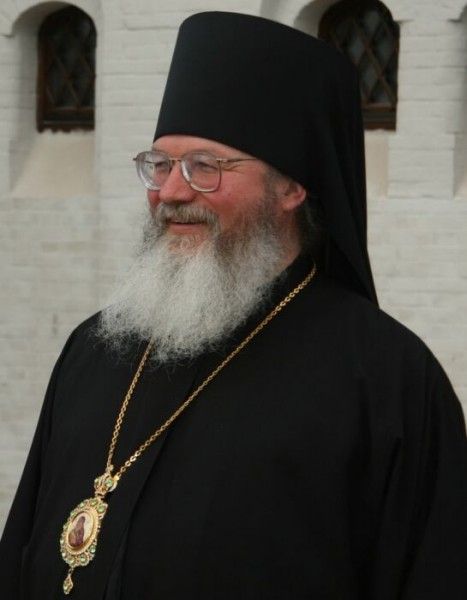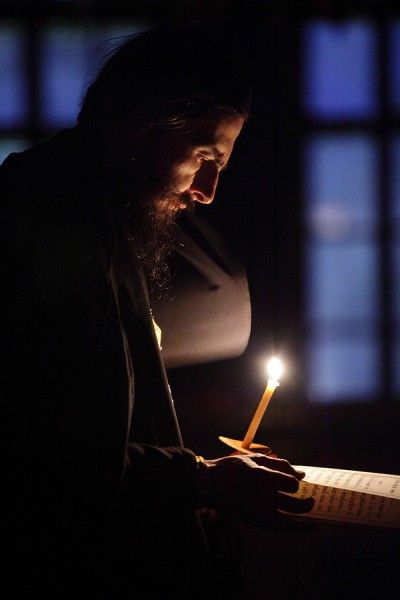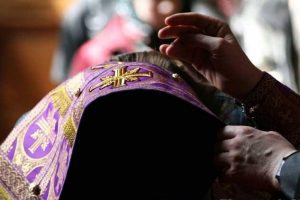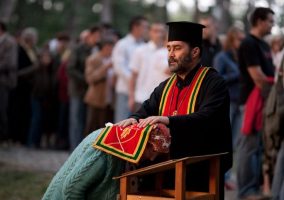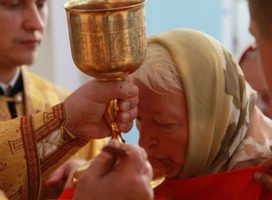The Revelation of Thoughts and a Layman’s Confession
Vladyka, today one can hear different points of view regarding Confession: should it be frequent or rare, regular or only when one fall’s into grave sins… What approach, in your opinion, is the most accurate?
I think we have come to a period in the life of our Church when these questions are being tested by life. The practice of half a century ago or of the Synodal period has little acceptance: today, as a rule, people receive Commune more frequently. Yes, and life itself has changed a great deal. The previous approaches and solutions can no longer hold people, for which reasons new ones have developed, including in such discussions. It is very good that there are discussions, that people are aware of them, that they think and reason.
I believe that that these questions, in the end, will find their resolutions and I hope that they will not be fixed by any mandatory rules. Now is not the time for which there should exist a single template: Communion and Confession so many times in so many days. Moreover, there are no strict canons in these regards; there are various practices, different customs. There should be a certain degree of freedom in this important matter. Everyone, with the help of his confessor, should decide in his own way. And it is already the affair of the parishioner to find a confessor who can help him, the one he needs.
Should each Communion be accompanied by a preliminary Confession? Can one have Communion without Confession, or if the Confession is several days before Communion?
In my opinion, if someone does not feel any serious sins that would force him to seek out a full Confession, he should not be required to Confess before every Communion. The Mystery of Repentance is an important, independent Mystery, a “second baptism,” and it is unacceptable to reduce it to a certain obligatory appendage to the Eucharist. After all, Confession often becomes a formalism because one gets used to the thought that Confession is that which I tell before the Batiushka, while repentance is what I tell him. But this is, at best, revelation of thoughts. And often it is simply a conversation. There is no sincere, profound repentance before God and one might not even pay any attention to it.
One should understand that repentance does not take place only during the moment of Confession. Repentance is a condition of soul; it is the determination to break with sin and change one’s life. It can occur at any moment of life. People often ask: what should I do if at home I repented, wept, and then came to Confession and I have nothing in my heart and just confess dryly. That’s nothing to worry about. Glory to God, that you repented at home: the Lord will receive this.
If we thus understand repentance, then it becomes clear that one does not necessarily have to go to Confession to Batiushka before every Communion. It is fine if, receiving Communion three or four times a month, you Confess only twice.
Is our traditional practice of Confession as revelation of thoughts useful?
I don’t think that the revelation of thoughts is always useful for the laity. The Confession of the laity and monastic revelation of thoughts are entirely different things. A monk should ideally reveal to his spiritual father all the movements of his soul and receive a blessing for all of it. For the laity, this is impossible and even dangerous. It is strange when women ask their priests what they should ask their husbands: where to go on vacation, whether to buy this or another thing, to have more children…
Certain important events should be blessed by a priest, but it should not be determining and decisive. The laity should decide their own questions, connected with their life.
I am against monastic Eldership being extended to the laity: it paves the way for such a dangerous phenomenon as young eldership or, more accurately, false eldership. Laymen need to know the basics of the faith, to read the Gospel, and live according to it, making use of the advice of their spiritual father.
On Choosing a Spiritual Father
How should one choose a spiritual father today?
The same way as always. If there is no spiritual father, then don’t worry, pray that the Lord would send you to meet a priest who could indeed help one go towards God.
Here there is no need to hurry, and one needs to be very careful. Cases of false eldership, when a spiritual father intervenes in one’s whole life, are indeed quite frequent; and this does not depend on the age or position of the priest. A spiritual father should not decide anything in the life of his children; he should just warn him of error and sin.
Is it worthwhile for a layman to seek out a spiritual father in a monastery?
If it is an experienced spiritual father – why not? One can have a spiritual father in a monastery, come to him infrequently, when there are some serious problems in the spiritual life that need deciding, while one can confess ordinary sins to a parish priest. Many also find the opportunity to speak with their spiritual father by letter or by phone.
Is Confession by phone permissible? Metropolitan Benjamin (Fedchenkov) described how the Tver governor, looking out of the window of his home and seeing that the rebels were about to take him, called the bishop and confessed to him by telephone…
If we understand confession to mean not only the words that we speak at Confession, but our readiness to change, to forsake sin, and follow Christ, to live according to His holy commandments, then the question of how to implement it technically is secondary. One can repent at home in front of the icons, in the subway, on the telephone, or by sending messages. The main thing is what goes on in his soul.
But one cannot consider that Repentance as an ecclesial mystery can be performed by telephone. The mystery has a certain rite performed by the priest; it is the completion of this penitential doing.
On the Problems of Confessions of Young Priests
In our Church there is a problem that very young and thus far inexperienced priests are made to confess and at the same time to practice spiritual guidance.
Someone finishes seminary at the age of twenty or so, has only just married or gotten tonsured, receives ordination, and begins to guide. But how is he going to guide, when he does not yet know either spiritual life or practical difficulties. The Greek Church follows a different practice: it supplies spiritual fathers. Over the priest is performed a certain rite of prayer, and only then can a priest accept the Confession and spiritual guidance of other people. This sometimes leads to another extreme: Confession becomes sparse, which is also bad.
If we had enough priests with both spiritual and life experience, then we wouldn’t have such problems. I would, in an amicable way, not put people younger than forty to hear Confessions. But we can’t afford this. There isn’t enough clergy, not even to mention spiritual fathers…
How can a priest teach his spiritual children to repent?
You cannot teach what you don’t have yourself. In order to teach others to repent, a priest himself must learn how to repent. Unfortunately, many priests, especially those who serve at secular parishes, repent and confess very infrequently. That’s how it is: the spiritual fathers in the dioceses are busy, and the Batiushkas themselves are busy…
It’s good in big city parishes: several priests serve, and can confess one another. But even this isn’t always in place. It happens that they don’t trust each other very much.
Lack of trust among brethren: this is bad and in need of eradication, or is it normal?
That’s life. Of course, it’s better if there’s trust, but there isn’t always. Strictly speaking, that’s why one needs a spiritual father or priest whom you can trust.
Prayer is Labor
Repentance teaches prayer. If one doesn’t have the experience of a real spiritual life; if there is no experience of prayer and personal standing before God, then there can be no real, profound, and sincere repentance. Prayer, especially penitential, as it were paves the way for the soul to God. One of the most important, at least for monks, prayers is the Jesus Prayer, which is a penitential spirit. The very standing before God can practically be no other than penitential, at that level of spiritual development at which most of us are found.
On the other hand, prayer is a gift from above…
Prayer is labor. “The Kingdom of heaven suffereth violence, and the violent take it by force” (Matthew 11:12). This means that the Heavenly Kingdom is given to those make the efforts for its acquisition. That is why we have to force ourselves, even if prayer at first comes with difficulty. Of course, the Lord in His mercy gives grace and prayer to the one praying, but for this man must himself work on his soul.
Only thus does one learn repentance.
If one leads a dissipated life without prayer, then perhaps one day – if there’ll be a “thunder clap” – if he’ll come to a repentant and prayerful feeling, but that won’t be that gift about which you speak.
Communion As the Meaning of the Liturgy
Vladyka, how do you advice preparing for Communion?
A repentant feeling should accompany us constantly, and this should be our main preparation for Communion. If we will constantly prepare for partaking of Christ’s Holy Mysteries and receive them as often as we can, then this will be the correct Christian dispensation.
Up until now, oddly enough, there are arguments not only about the frequency, but also about the days when Communion is possible: certain priests do not Commune adults during Bright Week, because one is not supposed to fast during these days.
Then you don’t go to such priests. Let their churches be empty. If you’re somewhere out in the wilderness, then you’ll have to be patient. Or ask. Ask, and it will be given to you. Well, the priest himself serves (sometimes several times in a week)? He Communes. Why does he extend the other requirements of fasting on his parishioners? Why does he require of them fasting all week, but himself doesn’t fast? Why does he make himself such exceptions? Why does he extend “grievous burdens” on his flock?
If we fast on Wednesdays and Friday, no additional fast is necessary to prepare for Communion. Incidentally, on Athos that’s how they live: they fast on Monday, Wednesday, and Friday, and receive Commune four days a week: Tuesday, Thursday, Saturday (after fasting days), and Sunday. And this is perfectly correctly: people live in Christ. The Liturgy is the center of their life, around which everything else goes. Otherwise it’s impossible.
It’s understandable that people cannot live like monks. But one can strive so that the Liturgy and union with Christ would be at the center of one’s life.
The opinion of many Holy Fathers is known that one should Commune more often. This is understandable to anyone who even slightly studies this question. The meaning of the Liturgy is to receive Communion. After all, the Lord said: drink ye all from it — everyone receive Communion.
It’s another thing that we cannot always worthily approach the Chalice. But one should not exaggerate one’s unworthiness. “No one is worthy,” it says in the Liturgical prayer of St. Basil the Great. But this does not mean that one shouldn’t approach the Mystery – if we won’t Commune, there will be no Life in us, no Christ. We will simply perish. This should be completely clear to every Christian.
It happens that believers limit Communion to once a month or only to great feasts. This is not very good. In my opinion, for Christians it is correct to Commune of the Christ’s Holy Mysteries every Sunday service, and to prepare for this all the previous days – by prayer, an attentive life, and a penitent spirit. But, of course, every Christian should decide independently, in consultation with his confessor, when to take Communion.
Carefully monitor what it going on in one’s soul
But what should one do with one’s constant “split”? In church I am a churchly person, while in secular life I am an ordinary person person of jams and vanity… It often happens that we coexist as two different people – a light kind of “spiritual schizophrenia.” What kind of constant state of repentance is there?
Easy. There was some trouble; unkind words left the mouth. So you immediately need to go and repent. For this you need to carefully monitor what is going on in your soul. Then there will be no duality.
How did we live during the Soviet years? We had even greater contrast between the Church and ordinary life. But even in these conditions, we tried to define life by faith.
We should build our life on faith, on the Gospel, on the commandments – regardless of the conditions under which it occurs.
Especially now, there is more vanity than there was then. All the same. And, in my opinion, it was always in any society. You would think that in ancient times there was no vanity outside church life. Of course there was! And people were just as distracted. But we should seek, above all, the kingdom of God, and the rest to us. This should be the main thing for the Christian.
But in the middle ages things were arranged differently, and the rhythm of life was subordinate to the Church, at least on the level of prayer and fasting: at some point, everyone went to the services, on a certain day everyone changed their diet… Moreover, people weren’t so public: Internet users are constantly on the mind. Personally, for example, when I write in a blog or social site, a problem arises: I try to be sincere, but I still have the feeling of the painting: I am showing this to people, I want them to look at it. I think that modern man is tempting hypocrisy: not a direct lie, but something subtle.
I don’t think that the main thing has changed dramatically from the past. Of course, we are undergoing tremendous load information; we are much more than our ancestors, are involved in the life of the world, we have less time than they can spend in silence and solititude. But the fundamentals of human life in the world remain unchanged. We just have to follow what our Lord said: open the Gospel and act in accordance with His commandments.
How does one create a church community?
Another problem is the breaking up of community networks. Even common prayer, Liturgy, has become a private matter. How to make people feel the community, a single entity?
It depends on the parish priest. Will he be a good priest, will he have an active parish life, and Christian fellowship.
To achieve this, the priest must try to live as St. John of Kronstadt lived, so that his ministry would connect people.
There come all the forms of extra-liturgical parish activity. Trapeza, tea after the service – all this brings the priest to the people, and there arise more warm, humane, trusting relationships. If a parish priest is also the spiritual father for his parishioners, then during such trapezas he can talk about the spiritual life (it goes without saying that he won’t be talking about individual spiritual problems; here one can find time for face-to-face conversations.) It is very bad if the priest is not an available figure. He is the pastor.
The problem is that we know have big churches, including new ones. Several priests serve in them, and lots of people go there – but how can one find unity there? Old parish churches were very small. A spiritual father was a priest who knew his whole parish and whom the whole parish knew. This is the basis for the life of the community.
Translated from the Russian.












